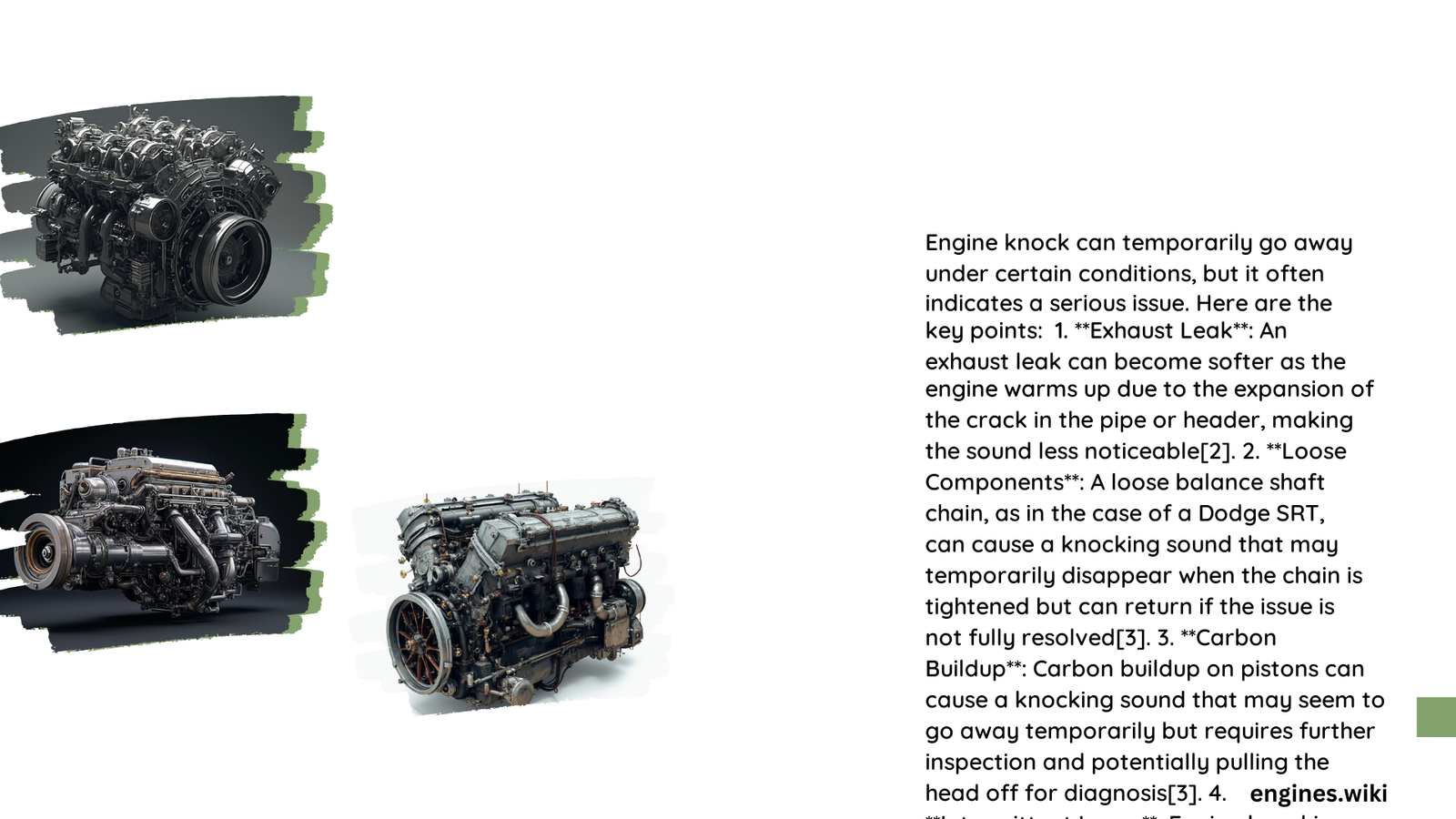Engine knock is a persistent issue that can significantly impact vehicle performance and longevity. While it’s possible to reduce or eliminate engine knock through proper maintenance and addressing underlying causes, complete resolution may not always be achievable, especially in engines prone to knocking due to design or operating conditions. This article explores the causes, solutions, and prevention techniques for engine knock.
What Causes Engine Knock to Persist?
Engine knock can persist due to several factors:
- Low Octane Fuel: Using fuel with a lower octane rating than recommended can lead to continuous knocking.
- Carbon Deposits: Buildup on engine internals creates hot spots that trigger premature ignition.
- Incorrect Ignition Timing: Improper calibration can exacerbate knocking issues.
- Lean Air-Fuel Mixture: This increases combustion temperatures, raising the risk of knock.
How Can Engine Knock Be Resolved?

Resolving engine knock often involves addressing the root causes:
- Switch to Higher Octane Fuel: Using the manufacturer-recommended octane rating or higher can eliminate knock in many cases.
- Clean Carbon Deposits: Utilize fuel additives or professional cleaning services to remove carbon buildup.
- Adjust Ignition Timing: Properly calibrate the ignition timing to reduce knock while maintaining performance.
- Enrich Air-Fuel Mixture: Adjust the mixture to reduce combustion temperatures and minimize knock risk.
What Are the Symptoms of Engine Knock?
Identifying engine knock is crucial for timely intervention:
- Metallic pinging or knocking noise, especially during acceleration
- Decreased engine performance and poor fuel economy
- Noticeable engine vibration in moderate to severe cases
How Is Engine Knock Quantitatively Assessed?
Quantitative assessment of engine knock involves:
- Knock Sensors: Measure vibrations and noises associated with knocking.
- In-Cylinder Pressure Measurements: Identify high pressure peaks indicative of knock.
- Crankcase Vibration Analysis: Used as a parameter for knock detection and severity assessment.
What Are Effective Engine Knock Prevention Techniques?
Preventing engine knock involves several strategies:
- Use Appropriate Fuel Octane Ratings:
- Always use the minimum octane rating recommended by the manufacturer
-
Consider using a higher octane fuel for added protection
-
Implement Timing Adjustments:
| Adjustment Type | Description | Example |
|—————–|————-|———|
| Adaptive Ignition Timing | Retard timing slightly | 10° to 8° BTDC |
| Exhaust Gas Recirculation | Lower combustion temperatures | Adjust based on load and speed | -
Follow Maintenance Schedules:
- Replace spark plugs regularly
- Use quality fuel additives to prevent carbon deposit buildup
What Are the Repair Options for Engine Knock?
When prevention fails, several repair options are available:
- Clean Carbon Deposits:
- Cost: $10 to $100
- Timeframe: Immediate to a few hours
-
Required: Fuel additives or professional cleaning services
-
Adjust Ignition Timing:
- Cost: Free (ECU adjustments) to $200 (professional tuning)
- Timeframe: Immediate to a few hours
-
Required: ECU software update or professional tuning service
-
Replace Spark Plugs:
- Cost: $50 to $200
- Timeframe: 1-3 hours
-
Required: New spark plugs, possibly a spark plug socket set
-
Install Turbocharger (extreme cases):
- Cost: $1,000 to $3,000+
- Timeframe: Several hours to a full day
- Required: Turbocharger, installation labor, possibly additional components
It’s important to note that while these repair options can significantly reduce or eliminate engine knock in many cases, some engines may have inherent design characteristics that make them more prone to knocking. In such cases, complete elimination of knock may not be possible, but proper maintenance and preventive measures can minimize its occurrence and impact on engine performance and longevity.
References:
1. https://www.vaia.com/en-us/explanations/engineering/automotive-engineering/knock-control/
2. https://en.wikipedia.org/wiki/Engine_knocking
3. https://fuelandfriction.com/weekend-warrior/how-to-prevent-engine-knocking/
